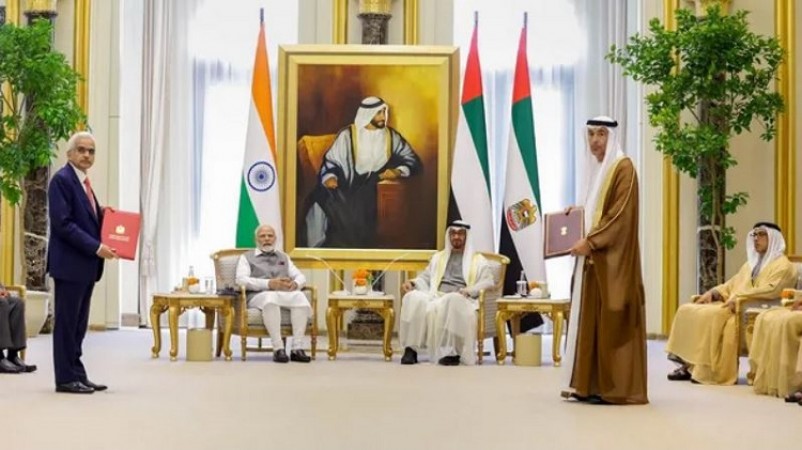
The Reserve Bank of India (RBI) and Central Bank of UAE (CBUAE) signed two groundbreaking agreements in Abu Dhabi on Saturday. These agreements aim to establish a robust framework for cross-border transactions in local currencies and the seamless interlinking of payment and messaging systems.
In the presence of Indian Prime Minister Narendra Modi and Sheikh Mohamed Bin Zayed Al Nahyan, President of the UAE, the two governors exchanged this significant memorandum of agreements (MoUs), laying the foundation for enhanced economic cooperation between the nations. The first MoU focuses on creating a framework that promotes the use of local currencies, namely the Indian rupee (INR) and the UAE dirham (AED), for cross-border transactions. Simultaneously, the second MoU emphasizes collaboration for interlinking the payment and messaging systems of the two countries.
Also Read India, UAE Agree on Local Currency Trade Settlement & Fast Payment System
India has taken proactive measures to encourage cross-border transactions in local currencies as part of its efforts to reduce reliance on the US dollar.
"The two MoUs aim to facilitate seamless cross-border transactions and payments while fostering greater economic cooperation between India and the UAE," stated the RBI.
The MoU concerning the establishment of a framework for the use of local currencies between India and the UAE intends to establish a Local Currency Settlement System (LCSS), which will promote bilateral use of the INR and AED. This system will cover all current account transactions as well as permitted capital account transactions.
"The creation of the LCSS will empower exporters and importers to invoice and transact in their respective domestic currencies, thereby developing an INR-AED foreign exchange market. This arrangement will also encourage investments and remittances between the two countries," added the RBI.
Also Read IIT Delhi to set up campus in Abu Dhabi, A Landmark Collaboration
Utilizing local currencies will optimize transaction costs and reduce settlement time for various transactions, including remittances from Indians residing in the UAE.
Regarding the agreement on "Payments and Messaging Systems," the RBI highlighted that the two central banks have agreed to collaborate on linking their respective Fast Payment Systems (FPSs) – India's Unified Payments Interface (UPI) with the UAE's Instant Payment Platform (IPP). Additionally, they will explore the integration of their Card Switches, specifically RuPay switch and UAESWITCH, while considering the linking of their payments messaging systems: India's Structured Financial Messaging System (SFMS) with the messaging system in the UAE.
Also Read PM Modi Engages in High-Level-Meet with UAE President, bilateral ties Focus
"The UPI-IPP linkage will enable users in both countries to make fast, convenient, safe, and cost-effective cross-border funds transfers," affirmed the RBI.
Furthermore, the interlinking of Card Switches will facilitate the mutual acceptance of domestic cards and the processing of card transactions. The integration of messaging systems aims to streamline bilateral financial messaging between India and the UAE.
Also Read India and France Ink MoU for Construction of Three Scorpene Submarines